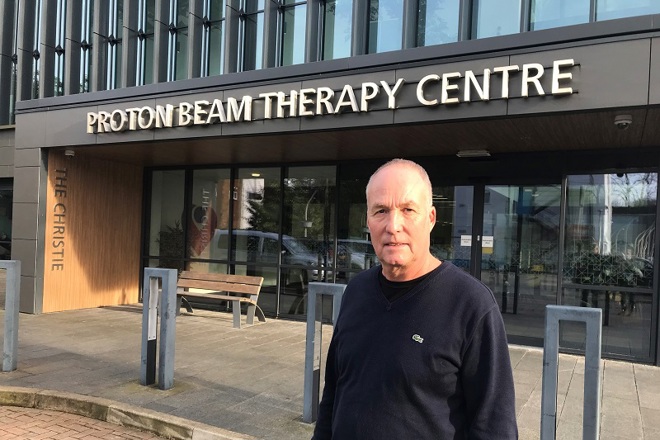The Christie is celebrating treating 1,000 patients with the pioneering cancer treatment of proton beam therapy (PBT).
Adrian Bishop, aged 56, from Rotherham, has recently become the 1,000th patient at The Christie to receive PBT after he was diagnosed with tonsil cancer last year when he noticed a painful ulcer at the back of his throat was getting bigger.
Doctors at his local cancer treatment centre in Sheffield explained that Adrian would be an ideal patient for proton beam therapy - a specialist form of radiotherapy that targets certain cancers very precisely, reducing side effects.
Whilst the current standard treatment is usually effective, patients with head and neck tumours, can suffer from long-term side effects including dry mouth, loss of taste, difficulty chewing and swallowing and problems with hearing. Some patients might need to use a feeding tube for the rest of their lives.
Grandad of 2 Adrian, who is married to Marie and works for Royal Mail, said: “I’m quite proud to be the 1,000th patient at The Christie to receive proton treatment. I hadn’t heard of it before. Everyone has heard of chemotherapy and radiotherapy, but not proton beam. When I learnt more about it, it looked an ideal way to help me suffer less side effects than the usual treatment can cause. I’m really pleased I was deemed eligible to be treated at The Christie.”
Adrian is currently midway through his treatment regime which will include 33 sessions of daily PBT treatment as well as 2 chemotherapy sessions. Adrian will stay at specially arranged and NHS-funded accommodation in Manchester throughout his time in the city.

Adrian added: “It is going well so far. The Christie is a fantastic place and is definitely in the business class of hospitals.
“I was obviously very frightened when I was diagnosed. It was a huge shock and in some ways, the mental impact is just as tough as the physical side. Fortunately my doctors explained that with the treatment it would be curable, so here I am in Manchester.
